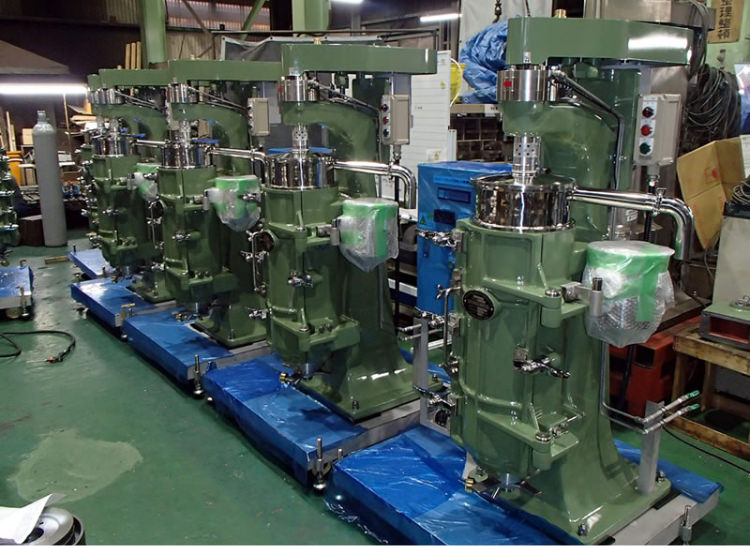What is a Centrifuge?

A centrifuge is a machine that spins a container with mixed substances at high speed to generate centrifugal force, using the difference in specific gravity to separate solids and liquids or liquids from other liquids. When a mixture is left stationary, heavier substances will settle at the bottom due to gravity, while lighter substances rise to the top, allowing for natural separation (sedimentation), but this process can take time. If you want to separate substances quickly, the container with the mixture is spun at high speed to apply centrifugal force, allowing for rapid separation. There are various types and sizes of centrifuges, and they are now used in a wide range of applications, including food, chemicals, energy, and pharmaceuticals.
Principle of a Centrifuge
For example, when you store dressing in the fridge, you might notice that the oil separates and rises to the top. This happens because the oil is lighter (has a lower specific gravity) than the water content in the dressing, causing it to float. Over time, the dressing naturally separates inside the container.
However, when you need to separate substances quickly, in large quantities, or when the specific gravity difference is small and difficult to separate, a centrifuge is used.
Types of Centrifuges
There are various types of centrifuges, categorized by separation method, rotation speed, separation capacity, and sample volume.
Separation by Centrifugal Filtration and Centrifugal Sedimentation
To separate solids and liquids, filtration is one method. When you pour hot water over ground coffee beans placed in a paper filter, the liquid coffee is extracted, but the coffee grounds are left behind, unable to pass through the filter. This is filtration. In a centrifuge, using a filter and applying strong centrifugal force to pass the mixture through the filter quickly is called centrifugal filtration.
*The paper filter, which allows liquid coffee through but blocks solid coffee grounds, is called a filter medium in filtration.
However, passing a mixture of water and oil through a paper filter will not separate them, as both can pass through the filter. In such cases, by applying pressure within the container, heavier substances (those with a higher specific gravity) sink to the bottom, while lighter substances rise to the top, similar to the dressing example. This method of separation is called centrifugal sedimentation.
Advantages of Centrifugal Filtration
Using a filter medium in centrifugal filtration allows for the complete separation of solids and liquids, minimizing the moisture content in the separated solid.
Centrifugal Filtration Video
Advantages of Centrifugal Sedimentation
This method allows for the separation of liquids that cannot be filtered using a filter medium.
Batch Centrifuges and Continuous Centrifuges
There are two types of centrifuges based on processing methods: the “batch centrifuge,” which separates a fixed quantity of material at a time, and the “continuous centrifuge,” which operates without stopping the machine and separates materials continuously.
Advantages of Batch Centrifuges
This method involves repeating a cycle of inputting the mixture, centrifuging, and discharging. You can control the duration of each cycle, making it easier to adjust the degree of separation and handle a variety of mixtures.
Batch Basket Centrifuge Video
Advantages of Continuous Centrifuges
This method allows for the continuous input of mixtures without stopping the machine, enabling the processing of large amounts of mixtures in a short time.
Continuous Centrifuge Video
Applications of Centrifuges
Centrifuges are used in a variety of applications, including food, chemicals, energy, pharmaceuticals, electronic materials, industrial waste, sludge, and recycling.
List of Japanese centrifuge manufacturers
Kansai Centrifuge Manufacturing Co., Ltd.
Centrifuges
Founded in 1918, this manufacturer specializes in centrifuges. With long-established expertise, they provide optimal solutions for customers in a variety of fields, including pharmaceuticals, food, fine chemicals, research, and recycling.
Tomoe Engineering Co., Ltd.
This domestic manufacturer specializes in decanter-type centrifuges and provides them to various industries, including petrochemical engineering.
TOMY Seiko Co., Ltd.
Centrifuges
TOMY supplies a wide range of equipment for fundamental research, essential for the advancement of biotechnology. This strong product development is supported by the company’s extensive knowledge and experience, as well as its customer-focused development approach.
Matsumoto Machine Manufacturing Co., Ltd.
How to Choose a Centrifuge
Even beginners can feel at ease! You can test the separation capability of the centrifuge before signing a contract.
Tanabe Willtec Co., Ltd.
Centrifuges Line UP
Comprehensive manufacturer of centrifuges
